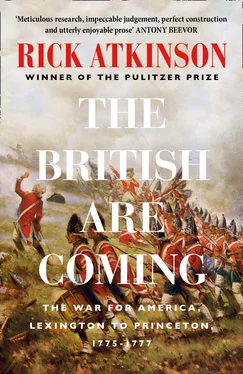Roughly a quarter million Americans would serve the cause in some military capacity. At least one in ten of them would die for that cause—25,674 deaths by one tally, as many as 35,800 by another. Those deaths were divided with rough parity among battle, disease, and British prisons, a larger proportion of the American population to perish in any conflict other than the Civil War. If many considered the war providential—ordained by God’s will and shaped by divine grace—certainly the outcome would also be determined by gutful soldiering, endurance, hard decisions (good and bad), and luck (good and bad). The odds were heavily stacked against the Americans: no colonial rebellion had ever succeeded in casting off imperial shackles. But, as Voltaire had observed, history is filled with the sound of silken slippers going downstairs and wooden shoes coming up.
This would not be a war between regimes or dynasties, fought for territory or the usual commercial advantages. Instead, what became known as the American Revolution was an improvised struggle between two peoples of a common heritage, now sundered by divergent values and conflicting visions of a world to come. Unlike most European wars of the eighteenth century, this one would not be fought by professional armies on flat, open terrain with reasonable roads, in daylight and good weather. And though it was fought in the age of reason, infused with Enlightenment ideals, this war, this civil war, would spiral into savagery, with sanguinary cruelty, casual killing, and atrocity.
Those 3,059 hard days would yield two tectonic results. The first was in the United Kingdom, where the reduction of the empire by about one-third, including the demolition of the new dominions in North America, proved to be as divisive as any misfortune to befall the nation in the eighteenth century, at a cost of £128 million and thousands of British lives. The broader conflict that began in 1778, with the intervention of European powers on America’s behalf, led to the only British defeat in the seven Anglo-French wars fought between 1689 and 1815. Of course, what was lost by force of arms could be regained, and a second British Empire, in different garb, would flourish in the next century.
The second consequence was epochal and enduring: the creation of the American republic. Surely among mankind’s most remarkable achievements, this majestic construct also inspired a creation myth that sometimes resembled a garish cartoon, a melodramatic tale of doughty yeomen resisting moronic, brutal lobsterbacks. The civil war that unspooled over those eight years would be both grander and more nuanced, a tale of heroes and knaves, of sacrifice and blunder, of redemption and profound suffering. Beyond the battlefield, then and forever, stood a shining city on a hill.
An unusual bustle disturbed placid Craven Street on Monday morning, March 20, 1775. At No. 27, a looming town house with fourteen fireplaces, crates and trunks had been packed and prepared for shipment. Visitors in fine carriages had recently been seen wheeling up and wheeling off, bidding good-bye, adieu, bon voyage. Among the neighbors it was rumored that after almost two decades in London, Dr. Franklin was going home.
He was famous in Craven Street, as he was famous everywhere, though he still referred to himself as “B. Franklin, printer.” Except for a brief return visit to Philadelphia in 1763–64, and a temporary move a few years later to a different house on the street, he had lived at No. 27 since arriving in England as a colonial agent in 1757. Because he was widely deemed a “universal genius”—the accolade did not displease him—his eccentricities were forgiven: chuffing up and down the nineteen oak stairs, dumbbells in hand, for exercise; sitting nude in the open window above the street, regardless of the season, for his morning “air bath”; playing his “harmonica,” an improbable contraption constructed of thirty-seven glass hemispheres mounted on an iron spindle and rotated with a foot treadle so that he could elicit three ghostly octaves by touching the moving edges with his moistened fingers. (Mozart and Beethoven, among others, would compose for the instrument.) And Craven Street had also been his laboratory, the site where he had launched inquiries into sunspots, magnetism, lead poisoning, the organic origins of coal, carriage wheel construction, and ocean salinity. At the foot of the street, on the Thames, he had repeated his celebrated kite-and-key demonstration; St. Paul’s Cathedral, nearby, was Britain’s first structure to install his lightning rod.
The tall man who emerged onto the front stoop that morning was now sixty-nine, with thin, graying hair and sensual lips that made him look younger. He retained the broad shoulders of the leather-apron tradesman who’d once carried lead type for a living, though he had grown plump enough to call himself “a fat old fellow.” Furrows creased the prominent dome of his forehead, and the hooded blue eyes sagged. “Anxiety begins to disturb my rest,” he had written a friend in America a few weeks earlier, “and whatever robs an old man of his sleep soon demolishes him.”
He had chosen to spend this final day in London in semi-seclusion with Joseph Priestley, a fellow natural philosopher who lived a mile distant. As Franklin made his way across the city he had once loved, those anxieties weighed on him. How far he had traveled, this fifteenth child of an impoverished Boston candlemaker! With only two years of formal schooling, he had become not only a prosperous printer but the largest bookseller in Philadelphia and the most prominent paper merchant in America. At forty-two, self-made, he retired from the trades to devote himself to good causes—smallpox inoculations, paper money, and streets made safer by night watchmen paid through public taxes. He also threw himself into practical science, with inventions ranging from bifocals to efficient stoves. He had once told his mother that for his epitaph, “I would rather have it said, ‘He died usefully,’ than, ‘He died rich.’” His 1751 treatise Experiments and Observations on Electricity brought international fame for discoveries lauded by a contemporary as “the greatest, perhaps, since the time of Sir Isaac Newton.” He not only invented the first device for storing electrical charges, he also named it—the battery—as he named other things in this new field: conductor, charge, discharge, armature. Electrical experimenters in France were known as franklinistes . The German philosopher Immanuel Kant called him “the new Prometheus,” a man who had captured heaven’s fire.
He was proud, perhaps prideful. The ink-stained printer became Dr. Franklin, thanks to the honorary degrees from Oxford and St. Andrews, and he was not above snickering at American provincialism. “Learned and ingenious foreigners that come to England almost all make a point of visiting me,” he had written in 1772 to his son William, who, thanks to Franklin’s influence, was the royal governor of New Jersey. “The K[ing] too has lately been heard to speak of me with great regard.” If esteemed and clubbable, he still at times seemed opaque. A man of masks and personas, he was Poor Richard, after the pseudonym adopted for the almanac he’d first published in 1732; he was also, thanks to his many whimsical pen names, Silence Dogood, Cecilia Shortface, and Obadiah Plainman. Since moving to London at age fifty-one to represent Pennsylvania, and then other colonies, he had used forty-two different signatures on his published articles.
So, too, was he a creature of contradiction. An advocate for the rights of man, he had owned slaves for thirty years, complaining that most of them were thieves. A man of temperance and discretion, he enjoyed “intrigues with low women that fell in my way” and took a common-law wife in 1730. Perhaps most confounding, he had been a zealous citizen of the empire, so exuberant in his Anglophilia that in September 1761 he curtailed a trip to the Continent to attend George III’s coronation. He had long favored excluding Germans and other non-English émigrés from the colonies. Americans “love and honor the name of Englishman,” Franklin had written in the London Chronicle in 1770; aping “English manners, fashions, and manufacturers, they have no desire of breaking the connections between the two countries.” Yet in the past year he had become so hostile to Britain that now he could fulminate like a Boston radical, his face white with rage. Franklin, these days, was a few steps ahead of an arrest warrant.
Читать дальше












